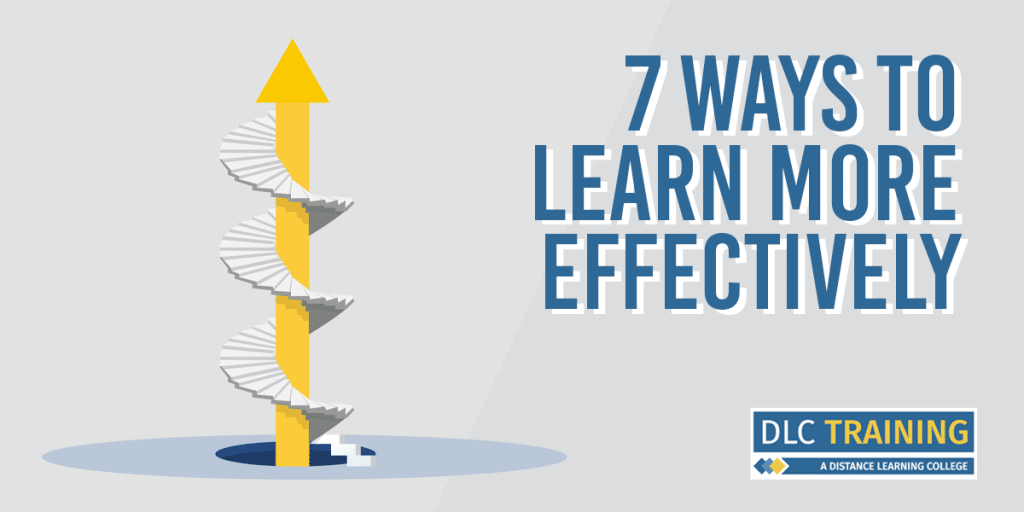The key to professional growth is learning. It allows us to develop our knowledge of topics, acquire new skills and improve in our roles. It also paves the way for progression opportunities throughout our careers.

Learning isn’t just important for our professional development, it’s also extremely fulfilling on a personal level. Acquiring new knowledge can boost your confidence, help you relate to others with different backgrounds, widen your interests and generally feel happier.
How to Learn More Effectively
Learning something new can be a difficult task regardless of your age, experience, or prior education. No matter what you are wanting to learn about, find out about seven ways you can make your learning as effective as possible:
- Have a Revision Plan
- Teach Others
- Consistency is Key
- Set Deadlines
- Break Everything Down
- Improve Your Time Management Skills
- Sleep Properly
Have a Revision Plan
It’s important to have a revision plan in place that will help you to learn as effectively as possible. Your revision plan should focus on include everything from where and when you revise to the learning styles you use during your revision sessions. Read our six tips on how to improve your revision for further information.
There are many different revision techniques that you can consider, from flashcards and mnemonics to audiobooks and memory games. It’s beneficial to work out what your preferred learning style is, so you can focus on revision techniques that will be most effective for you personally. Find out more about VARK learning styles and take our quiz to find out which learning style suits you, and the revision techniques that match with your style.
Teach Others
Regardless of your learning style, teaching others is one of the most effective ways to learn something new. When you know you need to teach someone about a certain topic, you need to make sure you’re knowledgeable enough about the topic to confidently communicate with someone else about it. When we know we’re going to teach someone else, it’s natural for us to seek potential gaps in our understanding and to make sure we have enough information to be able to answer questions about the subject.
You can ask anyone to help you with this task. We’d recommend asking a family member, a friend or a fellow learner. Make sure they’re interested in what you’re learning and are eager to help, as they’re more likely to ask you some good questions about the topic to challenge your knowledge.
Consistency is Key
Consistency is key when it comes to learning. Setting a certain time to sit down and study every day or every week will significantly help with your knowledge development. If you don’t set a schedule and don’t really feel like studying, you’re more likely to let days and weeks slip by without studying at all. If you’re strict and study even when you don’t feel like it, you will pick up new knowledge and be in a better position than you would have been by skipping the session altogether.
Set Deadlines
Like consistency, setting deadlines means you have to be strict with your time as you need to make sure you get your studying done in the time you have allocated for it. This will help prevent procrastination and avoid the stress that comes will cramming in too much studying at the last minute.
Break Everything Down
If you need to remember a lot of information, cramming your studying into a few big study sessions isn’t the way to go about it. By breaking down your topics into small chunks, you can concentrate on one new area at a time and increase the effectiveness of your learning over the course of a number of days or weeks. This will create less stress for you and is also the best process for moving new knowledge from your short-term memory into your long-term memory.
Improve Your Time Management Skills
Adopting a time management system for study periods can help with your learning. They can improve your focus, prevent procrastination and help ensure you get through everything you wanted to learn within the time you have set for your studies.
There are many different focus techniques that can be used for your learning. Different techniques may be suitable depending on the topics you’re learning about and the time you have to study. Your personality and your general motivation toward studying can also influence which techniques may be suitable. Access our resource on focus techniques to find out more.
Sleep Properly
The importance of getting the amount of sleep that your body needs cannot be stressed enough. If you’re sleep deprived you won’t be able to focus, think properly, or absorb information anywhere near as well as you would normally. If you try to compensate for this with a lot of caffeine, this could also have a negative effect on your concentration levels.
The best way to make sure you’re getting enough sleep is to make sure you go to bed and wake up at a similar time every day and have a nighttime routine that allows your body to relax and prepare for a good night’s sleep. Avoiding blue light before bed also helps you to get to sleep faster. Blue light can be found in LED TVs, computer monitors, smartphones and tablets.
Studying a course online? Discover how remote learning can make you more employable. Considering online learning but haven’t quite decided? Find out more about the online learning journey with DLC Training.